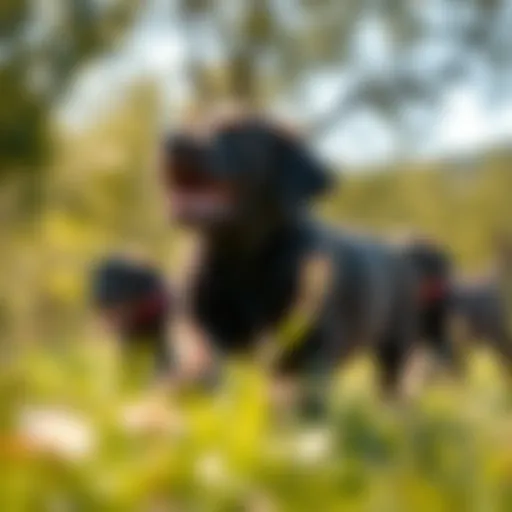Essential Nutritional Guidelines for Buff Orpington Chickens
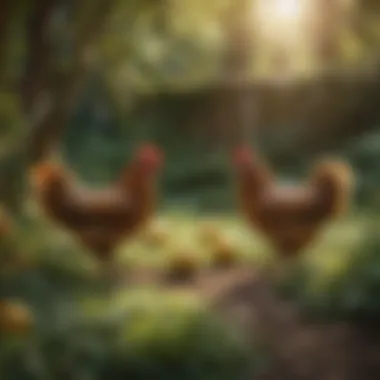

Intro
Buff Orpington chickens are cherished for their robust nature and prolific egg-laying capabilities. As poultry enthusiasts engage with this gentle breed, understanding their specific nutritional needs is paramount. When introducing Buff Orpingtons to your yard or farm, it is essential to build a diet that supports optimal growth, health, and production. This guide will navigate through various dietary requirements, best feeding practices, and essential tips for ensuring your chickens thrive throughout all life stages.
Nutrition stands at the core of well-being for Buff Orpingtons. A well-balanced diet fosters their energy, egg production, and overall health. Equally important is being aware of common feeding mistakes that many chicken owners make, which can lead to health issues down the road.
In this guide, we will explore vital areas of chicken nutrition including appropriate feed types, supplementary nutrition, and hydration needs. By adapting diets to meet the unique needs of Buff Orpingtons, owners can ensure their flocks are strong and productive.
Understanding Buff Orpington Chickens' Nutritional Needs
Understanding the nutritional needs of Buff Orpington chickens is critical for anyone interested in raising this breed. It directly impacts their health, productivity, and overall well-being. A balanced diet not only supports egg production but also ensures that the chickens grow strong and resist diseases. Therefore, identifying the specific elements that contribute to their nutritional requirements is essential for effective care.
Proper nutrition contributes to a robust immune system and enhances resilience against common ailments. Moreover, knowing how to feed Buff Orpingtons at different stages of their life cycle ensures they meet developmental milestones. The right approach to feeding can lead to improved egg production, better meat quality, and a longer lifespan.
Ultimately, understanding these nutritional needs fosters a positive relationship between the owner and the chickens, promoting an environment where both can thrive.
Essential Nutritional Components
The diet of Buff Orpington chickens must include several essential nutritional components. These components are critical for maintaining optimal health and ensuring efficient egg production. Key nutrients include:
- Proteins: These are vital for growth, repair of tissues, and egg formation. A diet rich in protein helps in muscle development and supports lactation in hens.
- Carbohydrates: Providing energy for daily activities is a primary role of carbohydrates. They help in maintaining stamina and overall vitality.
- Fats: Healthy fats can improve energy density and are important for feather health and insulation.
- Vitamins: Vitamins A, D, E, and B-complex vitamins are crucial for various physiological functions, including vision, immunity, and egg production.
- Minerals: Calcium is essential for egg shell quality, while phosphorus contributes to bone development and metabolism. Other trace minerals like zinc and selenium also play roles in immune function.
These components must be balanced within the diet to prevent deficiencies that could lead to health issues.
Caloric Requirements
Caloric requirements for Buff Orpington chickens can vary based on several factors, including age, weight, and activity level. An average adult Buff Orpington hen typically needs around 300 to 400 calories per day to maintain her health and support egg production.
As chicks and pullets, their caloric needs are lower, but it generally increases as they grow. Younger chickens require around 100 to 200 calories per day, which adjust as they move into adulthood.
Owners should observe their chickens closely to make adjustments in their feed. Signs of underfeeding include weight loss and decreased egg production. Conversely, overfeeding might lead to obesity, which can trigger health problems, including reproductive issues. Monitoring their weight and adjusting feed portions accordingly is wise.
Keeping accurate records of what and how much is fed can help in fine-tuning their diet. This approach assists in meeting their caloric requirements properly while ensuring that Buff Orpingtons enjoy a balanced and healthy life.
Types of Feed for Buff Orpington Chickens
Understanding the various types of feed available for Buff Orpington chickens is crucial for their overall health and productivity. Selecting the right feed ensures that these birds receive the essential nutrients and energy required for growth, egg production, and overall well-being. It is here that the role of feed becomes fundamental in the life of these chickens, as it directly impacts their performance and health.
Commercial Layer Feed
Commercial layer feed is specifically designed to meet the nutritional requirements of hens once they reach the laying stage. This feed typically contains high levels of protein, calcium, and essential vitamins and minerals. For Buff Orpington chickens, which are known for their prolific egg-laying abilities, commercial layer feed provides a balanced diet that supports egg production.
This type of feed often comes in pellet or crumble form, making it easy for chickens to consume. Some of the benefits include:
- Convenience: Readily available and easy to source from feed stores.
- Consistency: Formulated to ensure that every bite contains the same nutrients.
- Nutrient Dense: Often fortified with additional nutrients to promote optimal health.
When choosing commercial layer feed, it is important to look for products that list specific percentages of protein and calcium on the label. Feather quality and egg size can also be influenced by the feed quality.
Organic Feed Options
In recent years, many chicken owners have shifted towards organic feed options for their Buff Orpingtons. Organic feed is made from grains and ingredients that are grown without synthetic pesticides or fertilizers. Many owners believe this is a healthier option for their chickens and, by extension, for themselves, as these chickens produce eggs free from chemical residues.
Organic feed often includes:
- Whole grains: These provide energy and are easier to digest.
- Diverse ingredients: Including seeds, nuts, and legumes, which enhance the flavor and nutritional profile of the feed.
- No GMOs: Generally made without genetically modified organisms.
Switching to organic feed can have significant benefits, but it is essential to ensure that the feed still meets all nutritional standards required for Buff Orpingtons. It may be slightly more expensive than commercial options but offers peace of mind for conscientious owners.
Homemade Feed Recipes
Creating homemade feed for Buff Orpington chickens can be a rewarding endeavor. This approach allows chicken owners to have complete control over the ingredients, ensuring that their flock receives fresh and nutritious food. Homemade feed recipes can vary, but they should always aim to include essential nutrients such as proteins, carbohydrates, vitamins, and minerals.
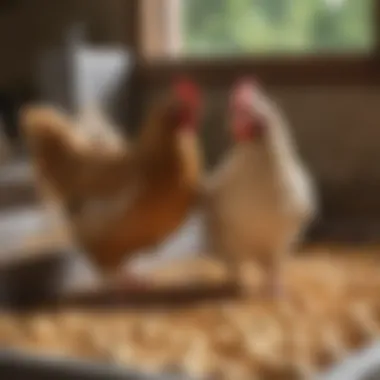

Some common ingredients for homemade feed include:
- Grains: Oats, wheat, and corn.
- Protein sources: Mealworms, fish meal, or even kitchen scraps such as legumes.
- Supplements: Ground limestone for calcium and diatomaceous earth for parasite control.
A simple homemade recipe could look like this:
It is important to balance the recipes to meet nutritional requirements and to monitor your chickens’ health closely when switching feeds. Homemade feeding requires a bit more effort, but it can foster a stronger bond between the chickens and their caretakers.
"A proper diet is not just about feeding chickens but cultivating a healthier and more productive flock that ensures quality eggs and meat."
By understanding these various feed types, Buff Orpington chicken owners can make informed decisions to foster the healthy growth and productivity of their flocks.
Supplementing Diets for Optimal Health
In the pursuit of maintaining optimal health for Buff Orpington chickens, supplementing their diet becomes a pivotal practice. This approach not only enhances their well-being but can also improve egg production and overall vitality. The insightful incorporation of supplements can address specific nutritional gaps that regular feed might not fully cover. Each supplement, whether vitamins, minerals, or probiotics, plays a unique role in fostering a robust and thriving flock. Understanding the significance of these elements is vital for chicken owners who wish to maximize the potential of their birds.
Vitamins and Minerals
Vitamins and minerals are fundamental to the growth and health of Buff Orpingtons. These nutrients aid in various bodily functions, from supporting metabolism to enhancing immune response. Vitamins such as A, D, E, and the B-complex group are especially important.
- Vitamin A helps in vision and immune functions.
- Vitamin D is crucial for calcium absorption which affects bone health and egg production.
- Vitamin E serves as an antioxidant to protect cells.
In terms of minerals, calcium and phosphorus are critical for strong bones and eggshell quality. Zinc, manganese, and selenium also contribute significantly by supporting reproductive health and metabolic processes. Incorporating a balanced mineral supplement can ensure that Buff Orpingtons receive adequate nutrition for their well-being.
Probiotics and Digestive Health
Probiotics are live microorganisms that provide health benefits, especially for digestive health. The digestive systems of Buff Orpingtons can be sensitive to changes in diet or stress. Introducing probiotics aids in maintaining a healthy gut flora, which can lead to improved nutrient absorption and enhanced immune function.
Probiotics can be added in the form of ready-made products or through fermented feeds. Fermented grains are a natural source of beneficial bacteria. By regularly including probiotics in their diet, Buff Orpingtons can have better digestion and a reduced risk of gastrointestinal diseases.
Calcium Sources for Egg Production
For Buff Orpington hens, ensuring adequate calcium intake is essential for optimal egg production. Calcium not only contributes to the formation of strong eggshells but also supports overall skeletal health. To meet their calcium needs, several sources can be included in their diet:
- Crushed oyster shells: This is a common supplement among poultry enthusiasts as it provides a readily absorbable form of calcium.
- Limestone grit: Another effective source, it helps grind food in the gizzard while supplying necessary calcium.
- Leafy greens: Vegetables such as kale and spinach contain calcium and can be fed as treats or mixed with their daily feed.
By adequately supplementing with these calcium sources, Buff Orpington owners ensure their hens remain productive and maintain their health.
"Understanding the specific needs of Buff Orpingtons in terms of vitamins, minerals, and probiotics can significantly enhance their health and productivity."
By focusing on these elements within their diet, chicken owners can cultivate a more vibrant and productive flock.
Feeding Buff Orpingtons at Different Life Stages
Feeding Buff Orpington chickens requires an understanding of their nutritional needs at various life stages. Each phase of their development brings distinct requirements that impact their growth, health, and egg production potential. Knowing how to tailor their diet can significantly enhance their well-being and productivity.
Chick Stage
During the chick stage, which lasts up to six weeks, proper nutrition is vital. Chicks require a high-protein diet to support rapid growth and development. Typically, a starter feed that comprises at least 18-20% protein is recommended. This feed should be granulated to facilitate easy consumption. Always ensure that the food is fresh and stored correctly to prevent spoilage.
It’s also essential to provide chicks with a source of clean water. They should always have access to water as it plays a critical role in digestion and overall health. Chickens are known to dehydrate quickly. Monitor their water intake to identify any issues early on.
Tip: To encourage them to eat and drink, scatter some feed on the ground, as it mimics their natural foraging behavior.
Pullets and Young Hens
When chickens reach the pullet stage, approximately between six weeks and six months, their dietary needs shift. As they prepare for laying eggs, a balanced diet becomes essential. Transition them to a grower feed that contains around 16% protein. This adjustment helps ensure they receive the necessary nutrients to reach maturity and lay healthy eggs.
Additionally, pullets require adequate calcium and phosphorus, though not as much as adult hens. To enhance their growth, include a mix of grains, greens, and possibly some kitchen scraps, while avoiding processed foods that are high in sugar and fat. It’s also a good practice to slowly introduce them to layer feed about a month before they start laying.
Adult Hens and Breeders
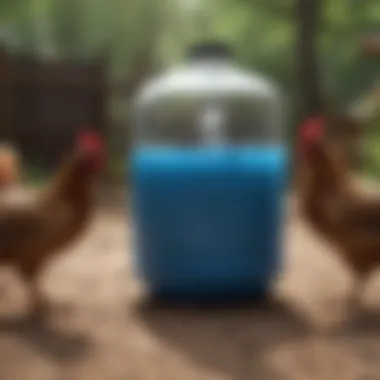

Adult hens and breeding Buff Orpingtons have specific dietary requirements that focus on sustaining egg production and overall health. Layer feed is crucial at this stage, providing about 16-18% protein along with increased calcium content necessary for eggshell strength. Easy access to grit is also important for efficient digestion.
Breeding hens may need nutritional supplementation to support reproductive health. Including omega-3 fatty acids through flaxseed or fish meal can improve egg quality and hatchability. Monitor their body condition to make necessary dietary adjustments.
In summary, adapting the diet according to the development stage ensures that Buff Orpingtons receive the right balance of nutrients. This not only impacts their growth rates but also influences egg production and overall health.
Common Feeding Mistakes to Avoid
Understanding the common feeding mistakes when caring for Buff Orpington chickens is crucial for their health and productivity. Improper feeding can lead to serious health issues, lower egg production, and affect the overall well-being of your birds. Avoiding these mistakes ensures your chickens receive the nutrients they require for optimal growth, egg-laying, and longevity.
Overfeeding and Its Effects
Overfeeding is a prevalent mistake among chicken owners. Many assume that providing excess food will result in increased egg production or faster growth rates. However, overfeeding can lead to obesity in Buff Orpingtons. Obese chickens may struggle with mobility and are more prone to health issues such as heart disease and reproductive problems.
To avoid overfeeding, it's vital to:
- Define a precise feeding schedule that meets the caloric needs of your chickens.
- Monitor their body condition regularly.
- Adjust portion sizes based on their activity levels.
In general, keeping track of how much feed is given and consumed each day helps to ensure that you do not exceed their daily caloric needs.
Neglecting Water Needs
Water is often overlooked but is essential for maintaining the health of Buff Orpington chickens. Any neglect in providing access to fresh, clean water can lead to dehydration. Dehydration can cause severe health issues and even lead to death if not addressed promptly. Buff Orpingtons require water to enhance digestion, regulate body temperature, and support overall metabolic functions.
It is important to ensure:
- There are enough water sources for all chickens, especially during hot weather.
- Water containers are cleaned regularly to avoid contamination.
In hot weather, Buff Orpingtons may drink more water than usual, thus increasing the need for regular checks on water availability.
Misunderstanding Feeding Labels
Many chicken owners do not fully understand feed labels. Misinterpretations can lead to poor feeding choices that do not align with the nutritional needs of Buff Orpingtons. Certain brands may focus on specific ingredients while others are more comprehensive. Knowing how to read these labels greatly impacts the health and productivity of your flock.
When examining feed labels, pay attention to:
- The protein content: Buff Orpingtons require a certain percentage of protein for egg production and overall health.
- Ingredients list: Ensure the feed contains quality sources of nutrients, and avoid those with excessive fillers.
- Guarantees: Look for guaranteed analysis that outlines essential nutritional elements.
Understanding these components effectively ensures you provide the best nutrition for your Buff Orpingtons.
Keeping an eye on feeding practices can prevent common mistakes that negatively affect your chickens’ health.
Hydration and Its Importance
Hydration is a crucial aspect of the overall health and well-being of Buff Orpington chickens. Just like with any living creature, safe and ample access to water supports vital bodily functions. Chickens are prone to dehydration, which can lead to significant health issues if not addressed promptly. For Buff Orpingtons, adequate hydration is particularly important due to their active nature and needs for egg production. Proper hydration fosters better digestion, nutrient absorption, and helps regulate body temperature, especially in extreme weather conditions.
Incorporating effective hydration practices is pivotal for sustained productivity and optimal health in your flock. The following sections will explore daily water requirements for Buff Orpingtons, and how various environmental factors affect their water intake.
Daily Water Needs for Buff Orpingtons
Buff Orpingtons typically need access to fresh water at all times. On average, each adult chicken should drink approximately 0.5 to 1 liter of water every day. This figure may vary based on factors such as age, diet, and activity level. For young chicks, the water intake is lower, but as they grow, their needs increase.
A few important factors affect their daily water requirements:
- Diet: The type of feed given can impact water consumption. Dry feed may require more water to help with digestion.
- Temperature: As temperature rises, chickens drink more to regulate body heat.
- Reproductive Stage: Laying hens often require more water for producing eggs.
Providing clean, freshwater should be a top priority for chicken owners. It is advisable to check water bowls or troughs regularly for cleanliness, ensuring that bacteria or contaminants do not pose a risk to health.
How Weather Affects Water Intake
The weather has a direct impact on the hydration needs of Buff Orpington chickens. During hot days, their water intake can significantly increase as they seek to cool down. Chickens regulate body temperature through panting, which elevates their need for hydration. In such conditions, they may drink two to three times more water than usual, so providing sufficient supply is imperative to prevent dehydration.
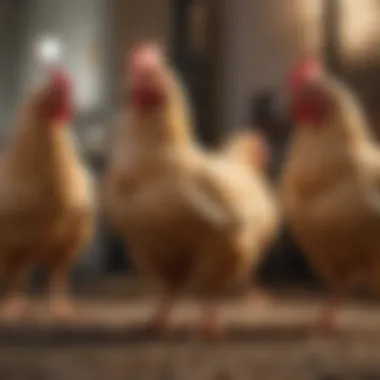

Conversely, cold weather might reduce their drinking habits. Chickens may be less inclined to consume water, particularly if it is frozen. It is essential to monitor for these changes and ensure drinking water is always available.
In summary, understanding daily water needs and the influence of weather can help you maintain a healthy flock of Buff Orpington chickens. Consistent access to fresh water leads to better health outcomes and can significantly enhance egg production efficiency.
Innovative Feeding Techniques
Innovative feeding techniques are vital for maximizing the health and productivity of Buff Orpington chickens. These methods not only improve feeding efficiency but also promote natural behaviors. Properly designed feeding strategies can lead to better nutrient absorption, which is crucial for egg production and overall well-being. In this section, we explore how these techniques can be incorporated into daily care practices with consideration for various environmental factors and the chickens' innate behaviors.
Using Feeding Stations
Feeding stations are particularly useful for managing multiple chickens, ensuring that each bird has access to food without competition.
- Design and Location: Make sure that feeding stations are easy to access and placed at a comfortable height for Buff Orpingtons. The design should prevent feed spillage and waste. Station placement should consider sun and shade, adapting it to weather changes throughout the year.
- Portion Control: With feeding stations, you can implement portion control. This means you can monitor how much each chicken consumes, reducing the risk of overweight birds. It can also help you identify any health issues if one chicken eats significantly less than the others.
- Sanitation: Regular cleaning of feeding stations is essential to prevent the growth of mold and bacteria. A clean feeding environment is significant for chicken health and prevents diseases.
Foraging and Its Benefits
Foraging is a natural behavior that Buff Orpingtons exhibit, and facilitating this can greatly enhance their diets. Encouraging foraging has several benefits:
- Nutritional Diversity: When chickens forage, they often seek insects, seeds, and greens, which boosts their diet. This diversity can lead to improved nutrient intake, supporting better immune function and egg production.
- Mental Stimulation: Foraging provides cognitive challenges for the chickens. This can help prevent boredom and reduce aggressive or destructive behaviors. Keeping Buff Orpingtons mentally stimulated is integral for their happiness.
- Physical Exercise: Foraging promotes physical activity, which is beneficial for muscle development and avoids obesity. A physically active chicken tends to be healthier and more productive.
By integrating feeding stations and encouraging foraging, Buff Orpington chicken owners can optimize their feeding practices. Both of these innovative techniques lead to healthier, happier chickens, which ultimately result in more reliable egg production and a flourishing flock.
"Innovative feeding practices are not merely beneficial; they are essential for maintaining optimal chicken health and productivity."
Implementing these strategies requires thoughtful planning and consistent maintenance but can lead to long-term benefits for both the chicken and the caretaker.
Integrating Feeding With Other Care Practices
Integrating feeding with other care practices is a cornerstone of ensuring Buff Orpington chickens are healthy and productive. The relationship between nutrition and overall well-being is profound. When feed management aligns with the chickens' living environment and health monitoring, it fosters a thriving flock.
Coop Maintenance and Cleanliness
Keeping the coop clean is essential for the health of Buff Orpingtons. A tidy living space reduces the risk of disease and parasites. Regularly changing bedding, removing old feed, and cleaning water containers should become part of the routine. Dirty coops can lead to respiratory issues and affect feed intake, which can, in turn, impact egg production.
Proper ventilation is also crucial. It helps control humidity levels and minimizes odors, creating a healthier environment for the chickens. During warmer months, it is advisable to ensure adequate airflow.
Remember, chickens may not eat well if their living conditions are unsatisfactory. Additionally, clean environments help to achieve better flock management and can provide insights into their feeding habits. For instance, if chickens seem less active or refuse to eat, a quick investigation into coop conditions might reveal underlying issues.
Monitoring Health and Behavior
Observing the health and behavior of Buff Orpingtons is just as important as providing balanced nutrition. Healthier chickens will show good weight and energy levels, while changes in behavior could signal health concerns. Regular checks on feather condition, activity levels, and stool appearance can help gauge the overall health of the flock.
Tracking feeding behavior is vital. If some chickens are not eating their feed, it could indicate an underlying problem, such as illness or stress.
Signs to Monitor:
- Loss of appetite: Could mean health issues or an unsuitable diet.
- Weight fluctuation: Rapid weight loss may signal disease or stress.
- Lethargy: Reduced activity can indicate discomfort or illness.
Monitoring should also encompass interactions among birds. Aggression can lead to some chickens being bullied away from the feed, affecting their nutrition. Interventions, such as adjusting feeder placements, may be necessary to promote equal access to food.
Integrating feeding practices with coop maintenance and health monitoring creates a harmonious environment that fosters the well-being of Buff Orpingtons. This approach not only enhances their productivity but also provides peace of mind for chicken owners.
Culmination: Cultivating a Healthy Feeding Routine
Creating a healthy feeding routine for Buff Orpington chickens is crucial for their overall well-being and productivity. A well-structured diet supports their natural growth, enhances egg production, and promotes a robust immune system. Therefore, understanding and implementing an effective feeding routine is central to raising healthy birds.
First, consistency in feeding schedules is important. Chickens thrive on regularity. By offering feed at the same times each day, you help them establish routine that decreases stress and improves digestion. A stable feeding schedule also allows for better monitoring of their appetite and health status.
Second, consider the type and quality of feed you provide. The nutritional needs of Buff Orpingtons are specific. A balanced diet that includes proteins, vitamins, and minerals is essential. You can achieve this by selecting high-quality commercial layer feeds or organic options. In addition, supplementing their diet with fresh vegetables and occasional grains can enhance their nutrition.
Hydration is another key component of a healthy feeding routine. Buff Orpingtons require access to clean, fresh water at all times. Dehydration can lead to severe health issues. Monitor their water supply, especially during hot weather, when their intake may increase.
Here are some considerations to keep in mind for a healthy feeding routine:
- Monitor portions: Avoid overfeeding; instead, provide small amounts throughout the day. This helps prevent obesity, a common issue in domesticated birds.
- Avoid sudden changes in diet: Chickens can be sensitive to abrupt changes in their food. Introduce new feeds gradually to avoid digestive issues.
- Regular health checks: Keeping a close eye on your flock helps identify any dietary deficiencies or health problems early. Look for changes in behavior, feather appearance, and egg production.
"A healthy diet is the foundation of vitality for Buff Orpington chickens. Consistency and quality are key."
In summary, cultivating a healthy feeding routine for Buff Orpington chickens encompasses consistency, quality feed choices, adequate hydration, and regular health monitoring. By prioritizing these factors, you create an environment that not only supports their health but also enhances their productivity and lifespan. This thoughtful approach ensures that your flock remains robust and continues to thrive.











